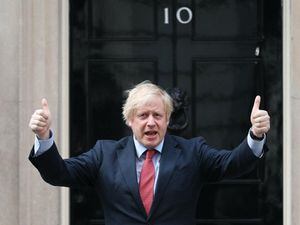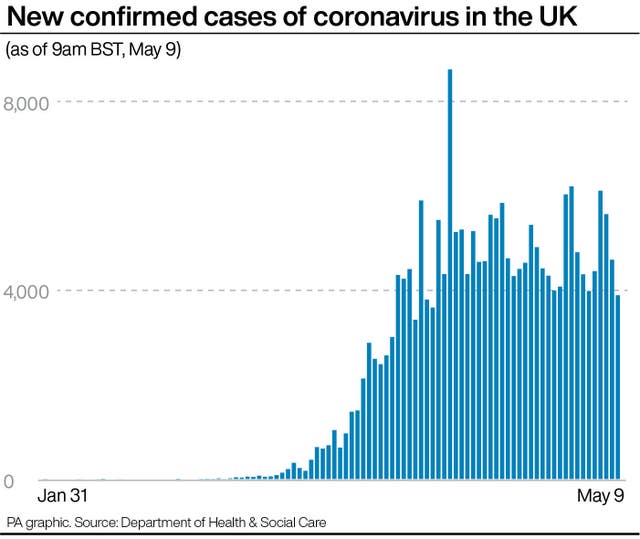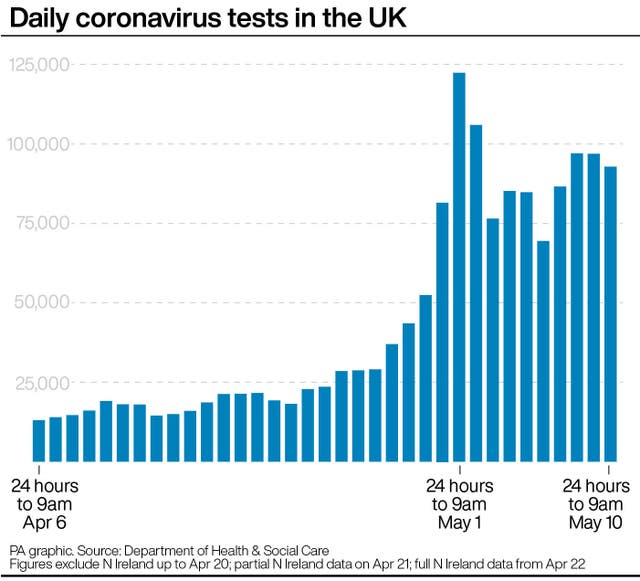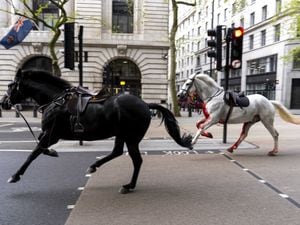Devolved leaders reject Johnson’s ‘stay alert’ advice in favour of ‘stay at home’
The Prime Minister is preparing to unveil his plans to ease the lockdown in a broadcast to the nation on Sunday evening.

Leaders of all the devolved nations have rejected Boris Johnson’s new “stay alert” advice in favour of keeping the “stay at home” message in the fight against coronavirus amid criticism that the new slogan is unclear.
The Prime Minister was dropping his stricter message as he prepared to unveil his plans to ease the lockdown in a broadcast to the nation on Sunday evening.
He is now telling the public to “stay at home as much as possible”, keep two metres apart when going out and “limit contact” with other people.
But the Government’s efforts to maintain a unified UK-wide response to the pandemic seemed to be in jeopardy as the devolved administrations rejected his message.

The leaders of Scotland, Wales and Northern Ireland said they had not been consulted over the “stay alert, control the virus and save lives” slogan.
Opposition politicians and a scientist advising the Government criticised the new message and Scottish First Minister Nicola Sturgeon said the first she had heard of “the PM’s new slogan” was in newspaper reports.
After a Cobra meeting with the PM and devolved leaders, Ms Sturgeon told the Westminster Government not to deploy the stay alert message north of the border, warning the “vague and imprecise” slogan could be “catastrophic”.
The First Minister said she does not know what “stay alert means”, adding: “Presumably we all live our lives in normal times staying alert to danger.”
She told her daily briefing that the lockdown remained firmly in place in Scotland but said her citizens could take unlimited exercise from Monday.
Ms Sturgeon was not asking additional businesses to open or for people to start returning to work.
And she said she does not expect Downing Street’s immediate changes to be “significant”, with any differences to Scotland being “relatively minor” for now.
Her Welsh counterpart, Mark Drakeford, said the “stay home” message has not changed in Wales and Northern Ireland First Minister Arlene Foster also said the nation will continue to use the “stay at home, protect the NHS, save lives” message.
Labour’s shadow Northern Ireland Secretary Louise Haigh accused the PM of having “decided to go it alone on messaging”, adding: “This isn’t only disrespectful, it’s dangerous.”
Downing Street sought to explain the “control the virus” aspect, saying the public could do that by keeping the rate of infection down by “staying alert and following the rules”.
“This is how we can continue to save lives and livelihoods as we start to recover from coronavirus,” a No 10 spokesman said.
But behavioural expert Professor Susan Michie, who is a member of the scientific advisory group for emergencies (Sage), said the new slogan is “a long way from” being clear and consistent.
“Dropping the ‘stay at home’ message from the main slogan in favour of generalised alertness may be taken as a green light by many to not stay at home and begin socialising with friends and other activities that increase the risk of transmission,” the UCL scientist told the PA news agency.
“This could potentially undermine the good work over the last few weeks that has seen impressively sustained high levels of adherence by the public in what for many are very challenging situations.”
In a speech at 7pm, Mr Johnson will outline his “road map” to a new normality with a warning system to track the outbreak, while official figures suggest the UK death toll has passed 36,800.
He acknowledged “this is the dangerous bit” but hopes to restart the economy by encouraging people back to work while maintaining social-distancing rules.
Communities Secretary Robert Jenrick said the new warning system will allow for restrictions to be strengthened or relaxed in different areas depending on localised outbreaks.
And he said it is the Government’s “strong preference” that all four nations agree to the same approach.
But he struggled to concisely explain exactly what the new advice means, when questioned on the BBC.
“Stay alert will mean stay alert by staying home as much as possible,” he told The Andrew Marr Show.
“But stay alert when you do go out by maintaining social distancing, washing your hands, respecting others in the workplace and the other settings that you will go to.”
Labour’s shadow health secretary Jonathan Ashworth called for the PM to give “crystal-clear clarity” on how the public must behave, saying the virus “thrives on ambiguity”.
The address is not expected to contain a great deal in the way of new policy, with the details being fleshed out in a document being published by the Government on Monday.

Mr Johnson will unveil a warning system administered by a new “joint biosecurity centre” which will detect local increases in infection rates.
With the alerts ranging from green in level one to red in level five, he will say the nation is close to moving down from four to three.
Later this week, the Prime Minister will address the 1922 Committee of backbench Conservatives amid concerns that some of his MPs will be unenthused by the gradual easing.
The incoming changes for England are only expected to be very modest, with a lifting of the limit of only one form of exercise per day and to permit garden centres to reopen.
But in a toughening of measures, fines for those who fail to abide by the rules will be hiked.
Ministers are also planning to impose a 14-day quarantine on people arriving in the UK by plane from any country apart from the Republic of Ireland.





